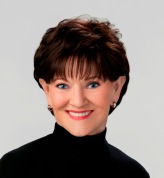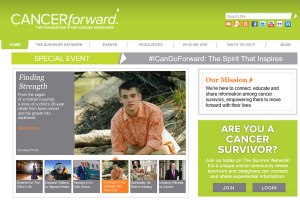Everyone has a wonderful story but not everyone knows how to tell it: CancerForward survivor stories
February 19, 2014 at 2:46 am 2 comments
Many health websites include stories, but some have richer sets of well-written stories than others. After seeing the stories in CancerForward™, I spoke to Beth Sanders Moore, the founder, to ask her why they include stories and how they solicit them.
 Beth (left) is herself a thirteen-year breast cancer survivor, her mother is a thirty-two-year breast cancer survivor, and her grandfather was a cancer survivor. Through these experiences she has seen how the experience of being a cancer patient has changed, with people asking questions and evaluating treatment options now in a way they didn’t even thirteen years ago. Beth has also seen a change in what survivors want, and CancerForward was created to meet this need, with survivorship stories being one of the most important components, both for the people who read them and those who tell them. Beth sees many ways that people try to make a difference – volunteering, making donations, or telling their story – and all provide a way to give back or pay it forward.stories in CancerForward™, I spoke to Beth Sanders Moore, the founder, to ask her why they include stories and how they solicit them.
Beth (left) is herself a thirteen-year breast cancer survivor, her mother is a thirty-two-year breast cancer survivor, and her grandfather was a cancer survivor. Through these experiences she has seen how the experience of being a cancer patient has changed, with people asking questions and evaluating treatment options now in a way they didn’t even thirteen years ago. Beth has also seen a change in what survivors want, and CancerForward was created to meet this need, with survivorship stories being one of the most important components, both for the people who read them and those who tell them. Beth sees many ways that people try to make a difference – volunteering, making donations, or telling their story – and all provide a way to give back or pay it forward.stories in CancerForward™, I spoke to Beth Sanders Moore, the founder, to ask her why they include stories and how they solicit them.
Since people are drawn to celebrities, the stories include those of high-profile survivors, like Cokie Roberts, but most of them are of people from all walks of life who have survived cancer. Having seen that the site includes a link to “Share Your Survivor Story”, I asked Beth about their process. When someone contacts them through this form, a writer works with them to help them tell their story. Beth said that some people submit stories that need little editing, while others need assistance because they don’t know how to express their experiences clearly or they become too caught up in emotions when recounting their story. Beth said that people process their experiences differently: some tell their stories soon after treatment, and some wait a long time into their survivorship. The completed stories are catalogued on CancerForward’s site by both cancer type and by practical, physical and emotional issues common to most survivors.
Interestingly, many stories shared with CancerForward are sent in the evening. Beth suspects that with fewer distractions of daily life, most people have more time for self-reflection at night and may also grow lonely and want to reach out by sharing their stories. She notes that far more people go on the CancerForward site and read stories than submit them. Some begin the “share” process and don’t finish it. The average time a site visitor stays on the site is about five minutes; some are less than a minute and some are for hours. If site visits are an indicator of popularity, the stories of high-profile women survivors are most popular, followed by the self-written stories submitted by women. That trend tracks with survivorship information consumption in general, says Beth. Historically, women discuss their experiences more openly and more often than men.
I asked Beth how many story inquiries they receive and she said 2-4 every month on their website. Many comments posted in connection with a story are essentially mini- stories. CancerForward maintains its Facebook page so that survivors and caregivers can make comments and/or post their stories there. I asked Beth if she thought people had stigma or privacy concerns about submitting stories, and she said that she thought it was a very individual decision to share a story although less likely in some cultures than others. She further thought that people feel good about sharing their story and receive support from others through the comments.
 When asked if time and money were infinite what CancerForward would do differently, Beth immediately said they’d add more video stories, which people enjoy. Producing high quality videos is costly, which has prevented CancerForward from creating as many as they would like. Because of the uptick in smart phone video production, there is a project underway in 2014 to accommodate appropriate “selfie” videos and brief self-written stories on the CancerForward site. Because the amount of the site’s educational information and story lines has grown so rapidly, CancerForward is reworking its entire site to make navigating the site and locating content easier for visitors.
When asked if time and money were infinite what CancerForward would do differently, Beth immediately said they’d add more video stories, which people enjoy. Producing high quality videos is costly, which has prevented CancerForward from creating as many as they would like. Because of the uptick in smart phone video production, there is a project underway in 2014 to accommodate appropriate “selfie” videos and brief self-written stories on the CancerForward site. Because the amount of the site’s educational information and story lines has grown so rapidly, CancerForward is reworking its entire site to make navigating the site and locating content easier for visitors.
Beth and I discussed how every story has a message. Cokie Roberts’ message was that cancer was not going to stop her. While at one point CancerForward considered letting people create blogs on the site, they ultimately decided that blogs are too personal and detailed while the stories convey a clear message and are more hopeful. In our discussion we identified a taxonomy of health sites that incorporate stories. They range, at one extreme, from sites that request stories but have none displayed, to, at the other extreme, Weight Watcher’s success stories, which are very professionally done. CancerForward’s stories are near that end, because of their use of writers to work with people. Beth concluded, “Everyone has a wonderful story but not everyone knows how to tell it.”
I asked Beth if she has a favorite story on the site, a question for which she said there isn’t a simple answer. At one time or another, she’s read every story that’s been submitted whether it made it through the publication process or not. “They’re not all upbeat or hopeful, but they’re all real and to me, compelling. There are so many, many facets to cancer survivorship and contexts in which people fight cancer.” Beth admits that for inspiration, she’s drawn to the stories of adolescent and young adult survivors who’ve readjusted their sails, succeeded in forging a “new normal” in their lives, and are moving forward. And, she concedes there is a story that she thinks about often that speaks to resilience and facing reality. It’s the last conversation Beth had with her friend, Elizabeth Edwards about two months before Ms. Edwards died of breast cancer. Believing it important that survivors speak openly about palliative care and preparing for death, Ms. Edwards allowed Beth to publish their personal conversation as a story for CancerForward. It turned out to be the last “interview” Mrs. Edwards would give about her cancer and her life.
Entry filed under: Uncategorized.
2 Comments Add your own
Leave a comment
Trackback this post | Subscribe to the comments via RSS Feed
 Lisa Gualtieri is Assistant Professor at Tufts University School of Medicine in the Department of Public Health and Community Medicine. She is Director of the
Lisa Gualtieri is Assistant Professor at Tufts University School of Medicine in the Department of Public Health and Community Medicine. She is Director of the
1. mdqmdq | February 20, 2014 at 5:33 pm
mdqmdq | February 20, 2014 at 5:33 pm
The last lines to the story my wife wrote about our son, Tony (pictured above), that is shared on CancerFoward’s web site are: A four-year-old wouldn’t have understood the scripture had you read it to him. So here, God in His mercy played out the whole drama for him with a one legged bird.
They that wait upon the Lord shall renew their strength; they shall mount up with wings as eagles. They shall run and not be weary; they shall walk and not faint. Isaiah 40:31
This is the link to Tony’s video (last year he competed in his first 5K run and then competed at the Texas Regional Paralympics in the 100m, 200m, & 400m races:
2. Marie Ennis-O'Connor (@JBBC) | February 19, 2014 at 4:19 am
Marie Ennis-O'Connor (@JBBC) | February 19, 2014 at 4:19 am
Stories are powerful. They are how we orient ourselves in our world and make sense of what is going on in it. . The very act of sharing our story with others counteracts the isolation we so often feel. It also carries within it the seeds of community and connection which is part of the healing process.